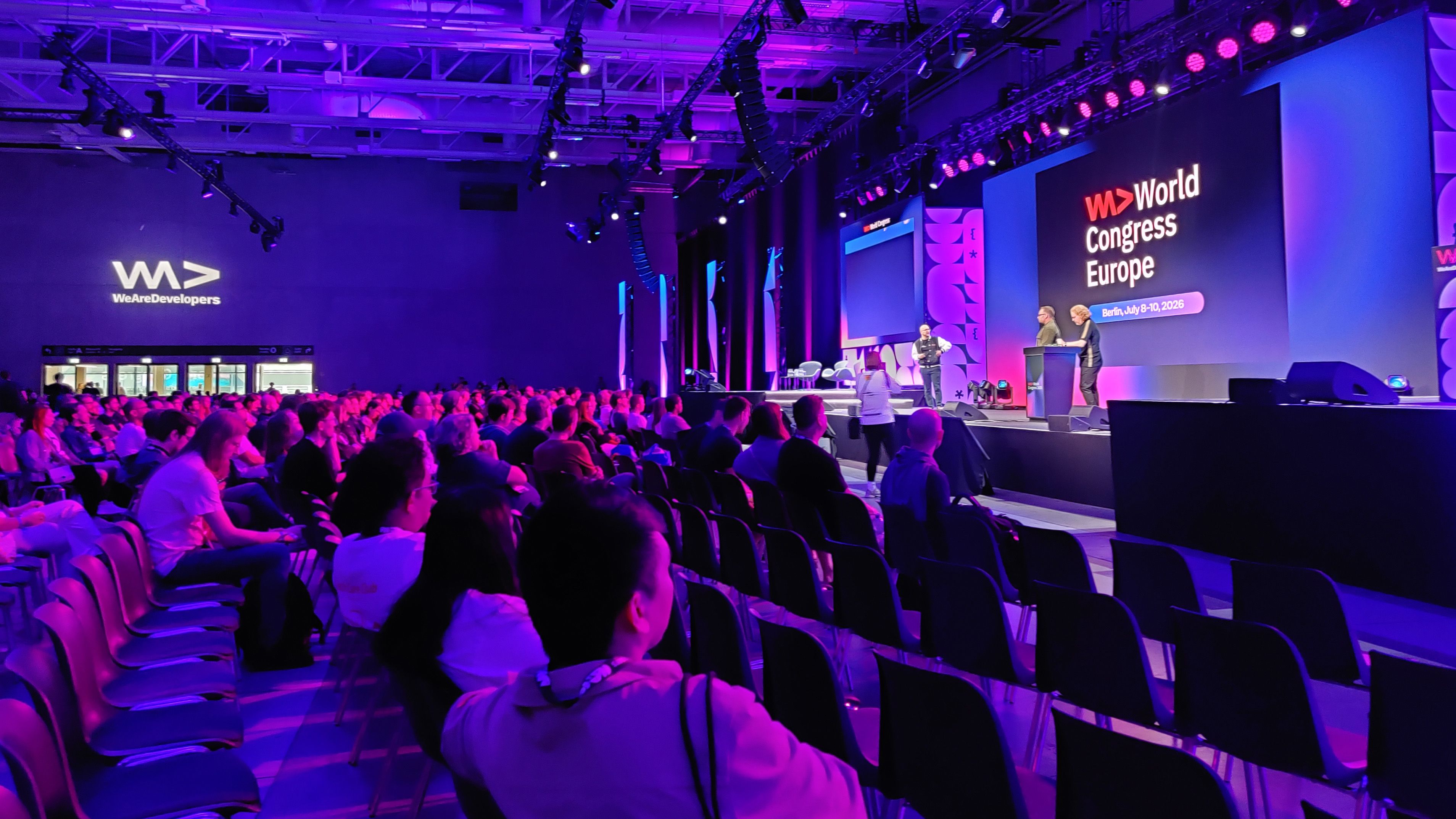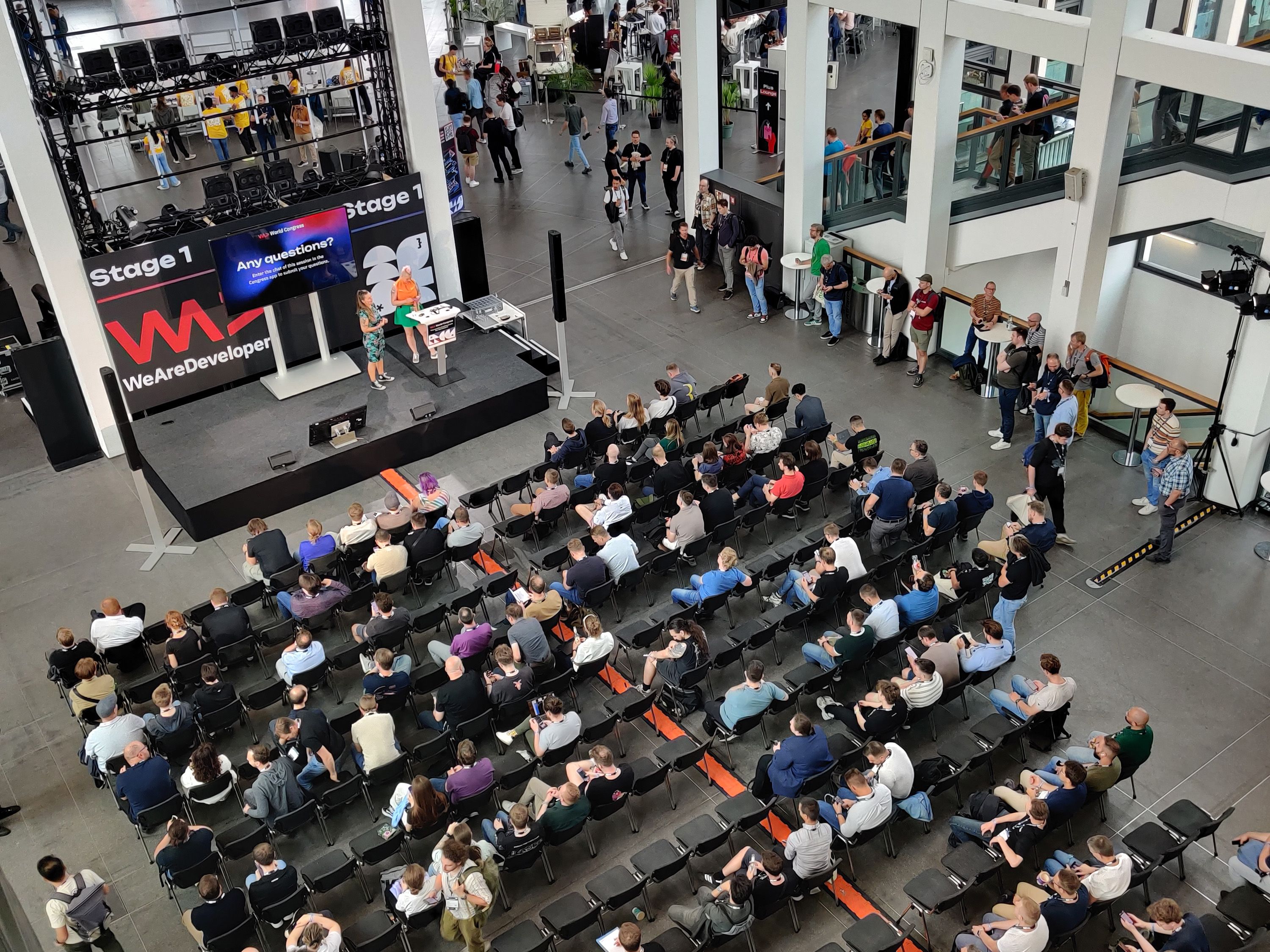WeAreDevelopers World Congress 2025

Recap
WeAreDevelopers World Congress 2025
More than 15,000 visitors, 16 stages in three exhibition halls, and nearly 500 talks on all topics currently relevant to developers - such an event deserves the name WeAreDevelopers World Congress, and of course webit! must not be missing there. That's why Svenja and Sebastian attended Europe's largest developer conference in Berlin for two days, bringing exciting insights from the fields of AI, programming languages, and accessibility.
The keynote by GitHub CEO Thomas Dohmke

The most important topic this year by far was the use of artificial intelligence in software development. This was already evident in the highly anticipated keynote by GitHub CEO Thomas Dohmke. GitHub plays a central role as one of the largest platforms for software projects and providers of several AI products in this field.
However, Thomas did not deal with the rapidly increasing technical possibilities, but with the question of whether there will be a need for people in software development in the future or if their tasks could simply be taken over by AI.
His answer is clear: AI can increase a person's productivity, but it cannot replace them as it requires their input to translate ideas into machine-readable code. Developers will still be needed, even more than ever. The job market is already tight, and the number of problems that software can solve is increasing. To illustrate, he jokingly gave a glimpse into his company's backlog, where some tickets have been waiting for implementation for up to 10 years.
C# in web development
The variety of presentations on C# and .NET technologies clearly showed that this programming language - which we also use daily at webit! - continues to be one of the best tools for web development and is constantly evolving.
We would like to highlight the presentations "Building resilient .NET Applications" by Sander ten Brinke, Lead Software Engineer at Arcady, and "Building ASP.NET Core Microservices" by Marc Müller from 4tecture, from which we were able to take away many practical tips for our own projects. Applications with high resilience, for example, automatically retry requests to third-party systems if they respond late or with an error, making them more stable overall. Microservices, on the other hand, are a way to divide a large codebase into several small projects. This allows multiple teams to work on them simultaneously and implement changes more easily and quickly. Thanks to Marc's presentation, we now have concrete approaches on how to better implement such an architecture in C#.
Digital Accessibility
Since the adoption of the European Accessibility Act, the frequency of presentations on accessibility has noticeably increased at developer conferences. As a result, some sessions at the congress were dedicated to the topic of inclusion in the digital space.
Topics included test-driven development with a focus on accessibility to ensure it from the beginning of development and challenges in implementing semantic HTML. The latter improves readability for screen readers used by visually impaired individuals. Particularly illustrative was a practical example of an accessible login process. Ramona Schwering from auth0 emphasized that it is often these everyday processes that exclude people with disabilities.
Ethical AI

At the WeAreDevelopers World Congress, there was a large number of presentations in the field of artificial intelligence. Many contributions impressively demonstrated what is already possible today and what awaits us in the near future. We were particularly interested in the responsible handling of AI. In line with this, the presentation "Killswitch or Moral Compass: Who programs AI’s Conscience?" by Torsten Stiller from E.ON caught our attention. Instead of just discussing emergency control mechanisms, he argued for equipping AI with a moral understanding of values from the very beginning.
In connection with this, we liked the session "Self-Hosted LLMs" by Roberto Carratalá and Cedric Clyburn, who work at Red Hat as Principal AI Architect and Senior Developer Advocate. The two vividly demonstrated how AI models can be operated locally independently of major providers. The great advantage of this is that one retains control over the processed data and does not become dependent on the provider's security measures. We found the explanations on the computing power required for operation particularly interesting. A specific use case demonstrated how certain models can now be easily fine-tuned for their deployment and available resources.
Our WeAreDevelopers World Congress 2025
In addition to the densely packed and highly professionally organized lecture program, we will especially remember the relaxed atmosphere and strong sense of community in the community. This was particularly evident once again in the closing lecture by Christian Heilmann from the Leadership Team of WeAreDevelopers. He reminded us that amidst all technical challenges, one aspect should be at the center: the joy of software development and the responsibility to pass this on to future generations.
In this spirit, GitHub CEO Thomas Dohmke concluded his keynote with the words: "The world has won if we generate happy, human developers. Here’s to build a happier world."
Share this post